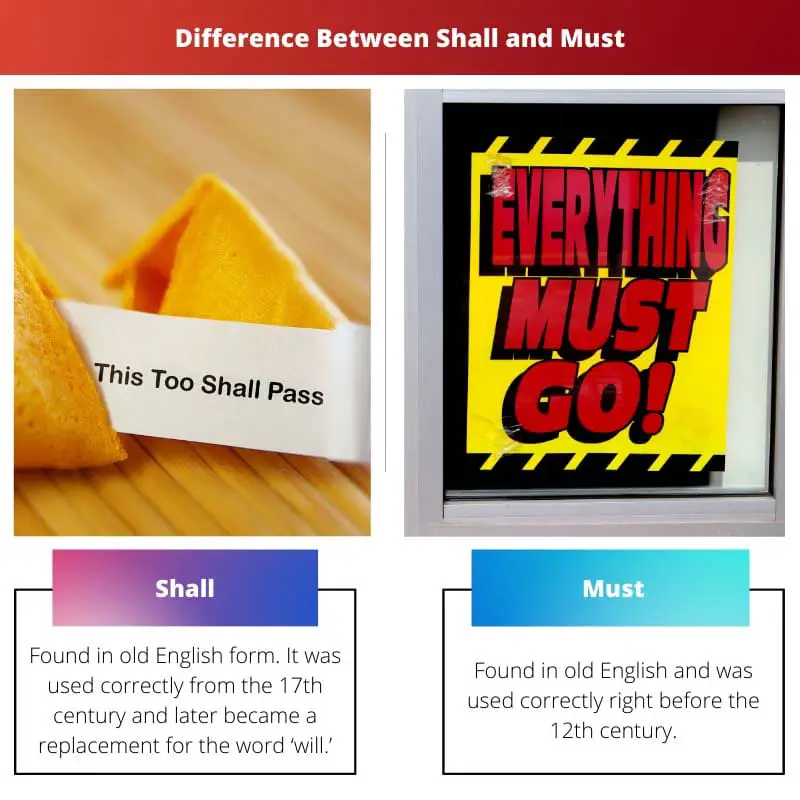‘Shall’ and ‘Must’ are two different words in the English language with similar meanings in the English dictionary. Both of these words mean that something ought to be or be mandatory to be carried out as a duty.
Although both have similar meanings, sometimes they cannot be used in place of each other.
Key Takeaways
- Shall indicate a legal requirement or obligation, while must is used to express a necessity or strong recommendation.
- Shall is used in legal or formal documents to specify mandatory actions. In contrast, it must is used in more general contexts to convey a sense of urgency or importance.
- The use of shall apply vs must depends on the context and the level of formality, with must being more common in everyday speech and writing.
Shall vs Must
The main difference between ”shall’ and ”must” is that as a verb, ‘shall’ is a modal auxiliary verb, whereas ‘must’ is something to do with certainty, indicating that the person is confident that the topic will have executed the predicated.

The word ‘shall’ is noted to be used when a sentence wishes to carry something which would take place in the future. It’s the replacement for the word will. This word is used to ask to offer something or ask for a piece of information or advice. This word is also used to indicate that something has to happen.
The word ‘must’ emphasizes a sentence that wishes to convey something to be for sure or mandatory done at a specific time. This term denotes that the action has to take place for sure. ‘Must’ is the most basic and straightforward of saying that something is compulsory or mandatory. It means you have no choice whether to do or not to do something. It can only be used in the present form to describe an obligation or future form for a future commitment.
Comparison Table
| Parameters Of Comparison | Shall | Must |
|---|---|---|
| Derivation Of The Word | Found in old English form. It was used correctly from the 17th century and later became a replacement for the word ‘will.’ | Found in old English and was used correctly right before the 12th century. |
| Grammatical Form | This word is a modal verb in place of the first, second, and third-person pronouns. It subjects a sentence leading to future tense. | This word is a modal auxiliary verb. Affirmative+form. It must come first in a verb phrase (after the subject and before the second verb). |
| Purpose | Generally, this word is used to express ideas and rules and when a speaker wishes to convey something that will occur in the future. | This word is used to emphasize the need for a particular requirement in a sentence that has to be done. Sometimes used in past tense too. |
| Example | ”You shall go to the ball with this man.” | ”I must buy some new slippers.” |
| Tense and Writing Format | It expresses future tense. Usually used in Formal communication. | It can express present as well as past tense. Mostly used in informal communication. |
What is Shall?
The word ‘shall’ is a modal auxiliary verb that indicates a strong assertion, desire, or intention to do something. Whenever this word is put in a sentence, it always refers to taking place shortly.
This word is sometimes used to give an order or a to while making a promise to someone. It also indicates the prerequisite of something or an event.
‘Shall’ appears in a sentence as a first-person pronoun having a traditional approach to suggest an opinion in the future tense. Example—
1. ”I shall try my best to attend my cousin’s wedding this weekend.”
2. ”I shall study hard during the Diwali vacations and score good marks in my examinations.”
When shall is used as a second or third person, it is denoted for opinion, signifying the phrase or sentence’s intensity. Example—
1. ‘The students shall attend the online Zoom meet, no matter how sick or busy they might be!’
2. ”You shall deliver the speech with utmost confidence and passion!”
The word shall is most commonly used to express laws stated by a form or entity. Example —
1. ”The government of our country shall make great strides in technology development in the upcoming years to bring about production efficiency, leading to rising in our country’s economy.”
2. ”The board of directors shall collectively decide who would be the upcoming CEO of the company.”

What is Must?
The word ‘Must’ is an English word that indicates the particularity or needs for a specific something.
Usually, when a sentence has to mean something is not to be overlooked or missed, it must be used as a noun. Using logic, ‘must’ help in making a conclusion or end statement.
This word is used with a past participle very, which means past possibilities. Example—
1. ”She must have found the keys.”
2. ”They must have reached home.”
The word ‘must’ is also used to give a recommendation emphatically. Example—
1. ”You must make one of these smoothie- makers; they’re great!”
2. ”You must see this movie. It is brilliant!”
Must is sometimes used to speculate the truth of something. Example—
1. ”She must be mad!”
2. ”There must be some mistake.”
3. ”You must be joking!”
‘Must’ can also be used in an interrogative sentence. Example —
1. ”Must you go soon?”
2. ”Must you go with them to a movie?”
‘Must’ is used even with a negative statement to forbid someone to do something. Example—
1. ”You must not cross when the light is red.”
2. ”You must not say things which would offend people.”

Main Differences Between Shall and Must
- Shall refer to absolute requirement, whereas must is equivalent to mere requirement.
- Shall is rare in everyday conversation, whereas must is used in everyday conversation.
- Shall is used in the future tense, whereas must maybe be used in the present and past tense.
- Shall is an option to do something, but ‘must’ doesn’t have an option as such whether to do or not to do something.
- ‘Shall’ signifies weightlessness and pretentiousness, while ‘must’ signifies and looks natural while speaking.

- https://heinonline.org/hol-cgi-bin/get_pdf.cgi?handle=hein.journals/aklr43§ion=38
- https://www.frontiersin.org/articles/10.3389/fnint.2012.00123/full

The text provides a clear distinction between ‘shall’ and ‘must’ and their usage in English. I appreciate how it lays out the grammatical form, purpose, and comparison between the two words.
I agree with the detailed discussion and examples provided in the text.
The distinction this text makes between ‘shall’ and ‘must’ is particularly helpful for those wanting to improve their grasp of the English language. The guidance offers readers a clear understanding of when to appropriately use each word.
I fully embrace the insights shared in the text. It provides a solid foundation for usage.
The focus on grammatical form and the purpose of using ‘shall’ and ‘must’ is commendable. It not only educates but also refines a reader’s understanding of the English language.
Absolutely, the meticulous breakdown of various aspects provides a comprehensive understanding of ‘shall’ and ‘must’.
The usage of ‘shall’ and ‘must’ has never been clearer to me than after reading this detailed text. It is both educational and enriching.
I completely agree. This text provides apt guidance that significantly improves language comprehension.
The explanation of ‘shall’ and ‘must’ is distinctly clear with comprehensive examples. It equips readers with a thorough understanding of the difference and correct usage of the two words.
The clear explanation paves the way for an enriched understanding of ‘shall’ and ‘must’. It’s meticulously articulated.
I completely agree. The text leaves no room for ambiguity and is an excellent guide for mastering language intricacies.
This text serves as an exceptional elucidation of ‘shall’ and ‘must’. I particularly appreciate the real-life examples, which make it easier to grasp and apply the knowledge gained.
I concur with your praise. The text offers language enthusiasts an educational and immersive reading experience.
The text is highly informative and aids in improving language precision. The comparison table it features is particularly effective in understanding the distinction between the two words.
I concur with your viewpoint. The content appeals to readers who appreciate detailed analysis and usage guidance.
The feature of a comparison table adds significant value to the content. It enhances clarity and understanding.
The explanation is comprehensive and well-organized. It has greatly improved my understanding of when to use ‘shall’ and ‘must’ appropriately.
Absolutely, the writing format and examples used make it very easy to comprehend.
I appreciate the real-life examples provided to illustrate the correct usage of ‘shall’ and ‘must’.
The substantial explanation and real-life examples help the reader in effectively differentiating how ‘shall’ and ‘must’ are used in the English language.
The text provides holistic insights and aids in accurately applying ‘shall’ and ‘must’ as per the context.
Absolutely, the text does an excellent job of elucidating the nuances and correct contexts for the use of ‘shall’ and ‘must’.
The examples and context in which ‘shall’ and ‘must’ are used make the reading experience very engaging and informative.
The text uses a logical approach to explain the differences and correct usage of ‘shall’ and ‘must’.
Absolutely, the text provides an in-depth understanding of these two words and enhances language comprehension.